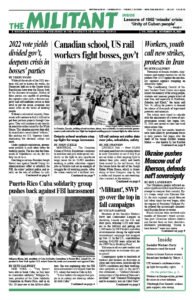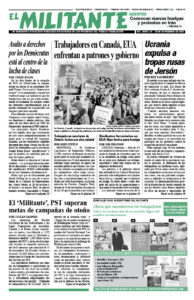MONTREAL — Forty people joined in a meeting here Oct. 29 to mark the 60th anniversary of the 1962 Cuba “missile” crisis and to discuss two books, October 1962: The ‘Missile’ Crisis as Seen From Cuba and Making History: Interviews with Four Generals of Cuba’s Revolutionary Armed Forces. The meeting was organized by Pathfinder Books, which distributes these titles in Canada, and endorsed by the Table de concertation de solidarite Quebec-Cuba.
Susana Malmierca, consul general of Cuba in Montreal, encouraged participants to read these books. “Cuba was a young revolution that had faced invasion in 1961 and was suffering from many subversive attacks,” she said. “We defended our sovereignty and our revolution. October 1962 was not only a heroic act but also a way forward.”
“There are many lessons from the 60th anniversary,” she said. “The unity of the Cuban people. Our willingness to defend our independence, to defend our goals, the tenacity of the Cuban people that does not give up.”
“We can find these same threats to Cuba today 60 years later,” she added. “Subversive acts of all kinds. During the pandemic the embargo was increased. Our losses are in the billions. Imagine the impact on a Third World country like Cuba despite the almost unanimous demands of the international community to end the embargo.”
In October 1962, in its hatred for Cuban working people making a socialist revolution, Washington pushed the world to the edge of nuclear war. The U.S. rulers had placed missiles in Turkey and Italy capable of reaching Moscow. Soviet leaders responded by asking the Cuban leadership if they would place similar arms in Cuba. Fidel Castro agreed, out of solidarity. Washington escalated its threats and war moves.
Led by Cuba’s revolutionary government, Cuban working people mobilized and showed their determination and readiness to defend their revolution. They blocked U.S. plans for a military assault, opening the way to resolve the crisis.
Moscow removed its missiles as Washington agreed to do the same.
Claude Morin, a retired professor of Latin American history at the University of Montreal, explained that October 1962: The ‘Missile’ Crisis as Seen From Cuba was unique. It describes “the defense of the Cuban Revolution and its socialist project, the affirmation of its independence and sovereignty, the mobilization, both spontaneous and organized, of the Cuban people in arms, and the strategic and political vision of Fidel Castro and the Cuban leaders. That is the substance of this account argued with force on the basis of abundant documentation.”
Philippe Tessier, a rail worker and member of the Communist League, spoke for Pathfinder. “The books we are presenting today show the way forward for those who fight against the ferocious competition among the capitalist powers that leads inevitably toward more wars like the invasion of Ukraine by Moscow,” he said.
“They are books for those who oppose the strengthening of the Canadian state to the detriment of our democratic freedoms, like we have seen with the first use of the Emergencies Act by the Liberal government of Justin Trudeau.”
“The communist leadership of Fidel Castro, the combatants of the Rebel Army and those who were won to this course during the struggle allowed the workers, farmers and all others exploited in Cuba to take in hand their destiny,” Tessier said. “It is for this reason that the capitalist governments, like Canada, have done everything in their power under the leadership of U.S. imperialism to destroy and overturn the revolution.
“Without building a revolutionary party here we cannot do what the Cubans did,” Tessier concluded. “That is our biggest contribution to the defense of the Cuban Revolution.”
Collette Lavergne spoke in the discussion on behalf of the Table de concertation de solidarite Quebec-Cuba. She encouraged participants to join a car caravan against the embargo that was taking place the next day.
After the meeting, Alexandre Jacob, a Canadian National train conductor and member of the Teamsters, told the Militant, “What struck me the most is how resilient the Cubans are.”

